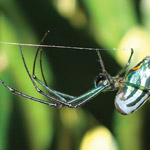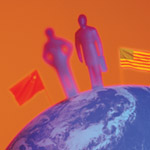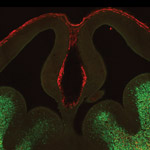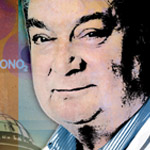The New Storm ChasersA biomedical engineer's search for the roots of lethal electrical tornadoes that overwhelm the heart.On a warm spring day last year, David Weisman left work mid-afternoon to take to the sky above an open field in suburban Washington. ¶ A lifelong model airplane enthusiast, Mr. Weisman, 76, had stowed his planes in his trunk that morning and after work headed out alone to the nearby field. The next time he was seen, long after midnight, he was lying dead on the ground not far from his car, with the airplane controller in-hand and a plane beside him. Read more > |
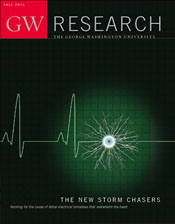 |
Research News
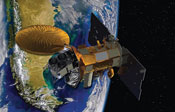
Anyone who's dunked their head in the ocean knows it's salty, but how salty is it? And how much does that vary? The questions are critical to better understanding Earth's climate, and a GW researcher is working with NASA to find answers within a pinch of salt per gallon of seawater.
$9M Propels Mid-East Studies, Global Security Research
A Tangled Web
In Brazil, GW biologists identify a long-lost spider linked to Charles Darwin.
There wasn't much to go on: a hundred words or so jotted in Charles Darwin's field notes and a formal description published a few years later. No specimen, no sketches. Read more >
Achievement Oriented
The success of female students in Ghana inspires a documentary, and may offer lessons for U.S. schools.
Turning down a dirt road in Accra, Ghana, Sally Nuamah stopped at a house in one of the area's toughest neighborhoods and got a new view of her research topic.
Read more >
Research Rising
In the new Science and Engineering Hall, GW officials see a global research hub in the nation's capital.
It is being called "transformative," a scholar magnet that will foster a new era of research—and, in the down-to-earth words of one Foggy Bottom resident, "a more than fair trade for a parking garage."
Read more >
Interpreting the Actions of Giants
Could the rise of China lead to Cold War-esque competition with the U.S.—or worse? A new international relations theory may hold the answer.
The end of the Cold War concluded one of the most dangerous periods in U.S. history. But now, only a couple of decades later, international relations theorists and policymakers worry that China's rise could lead to an equally dangerous, or possibly more dangerous, competition between superpowers. Read more >
Illuminating the Mind
As GW's Institute for Neuroscience marks its first year, we catch up with its director, Anthony-Samuel LaMantia.
W hen the university announced last year the establishment of an Institute for Neuroscience, founding director Anthony-Samuel LaMantia saw an opportunity to foster a community of neuroscientists and boost the caliber of neuroscience research on campus. Read more >
Nobel Ambition
New faculty member Ferid Murad brings a Nobel Prize, a passion for fostering future laureates, and ideas that he hopes could be medal-worthy, again.
The spell of restless nights had fallen, like clockwork, upon Ferid Murad during the early days of October 1998. ¶ It had been this way each October for a couple of years, ever since the murmurs began that his name was on the lips of his peers at such an auspicious point on the calendar.
Read more >

